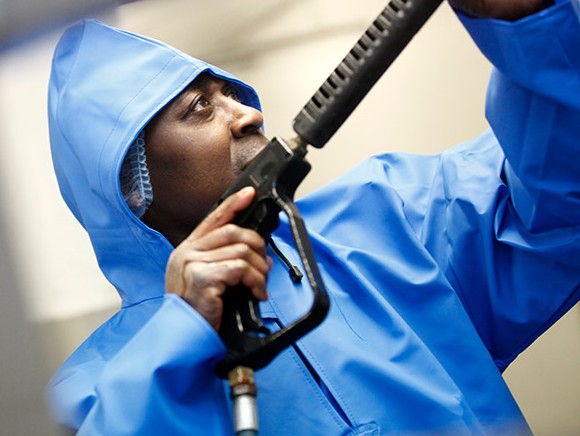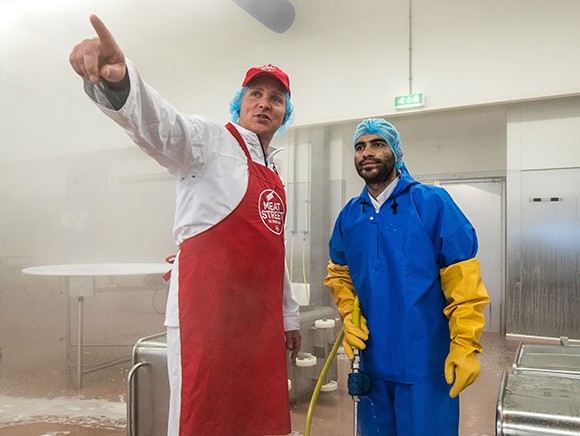
“For us, continuity is the most important thing of all,” says Robert-Jan Weel from Meatstreet, a meat processing company. By that, he means not only a consistently high level of hygiene but also continuity in the standard of cleaning, ideally based on regular and well-trained employees. And Hago Food & Industry, which deploys a regional pool of specialised cleaning professionals to local customers, has been providing him with just that since the start of their partnership in 2015.
“We buy in technical cuts of lamb, beef, veal and pork and process them. We do the same with chicken, game and poultry,” explains Robert-Jan Weel, Production Manager at Meatstreet in Beverwijk. “Our trained butchers preferably debone these cuts themselves.” Weel and his team of skilled butchers process 35,000 to 40,000 kilos of meat a week and, following several acquisitions, the company has several other sites that handle similar sorts of volumes. Beverwijk-based Prime Meat merged with Lebouille in Born, Strogoff in Schagen and Meatstreet in Ridderkerk, for example. Prime Meat met its match in all of these processing companies in terms of their motivation to make special products and their meat-related knowledge and traditional skills. Prime Meat’s board of directors decided on a single name: Meatstreet. Weel: “We supply to foodservice clients in the region, but also to ready-meal manufacturers, restaurants at Amsterdam Airport Schiphol and customers in catering and healthcare, partly in conjunction with Bidfood.”
To ensure its continued compliance with the strict hygiene requirements that apply in the food industry, and especially in the meat industry, the meat processing company takes a number of measures. “That starts with the sequence in which we handle the different types of meat on the production line,” adds Weel. “Pork is always processed last because beef can’t ‘hurt’ pork, but pork can contaminate beef. Chicken is processed in a separate production area, and the same holds true for all the meat products we make ourselves. In addition to HACCP certification, we’re also BRC-AA certified.” BRC stands for British Retail Consortium. The BRC Food standard dictates hygiene and food safety requirements for food processing companies that supply directly to the retail sector.
‘The communication lines are short and Hago is easy to contact’
Another important aspect of the company’s hygiene policy is its choice of supplier: food industry cleaning specialist Hago Food & Industry. Weel: “We have worked with other cleaning contractors and during the recession we even did our own cleaning for a while, but we’ve now brought in specialist support which means we can focus on doing what we’re good at. Continuity is a very important factor. We can’t afford to face technical problems when we arrive in the morning. Everything has to be in tip-top condition so that our production activities can get underway immediately. We have deadlines to meet, orders to be collected and deliveries that must leave on time.”
Two cleaning professionals work here every day from 15:30 to 21:00 h. The operatives sweep the production areas before leaving, and then the cleaning team clean them with a high-pressure unit combined with a chemical foam. High-pressure cleaning is too risky for some machines, so the butchers clean them themselves, and the same goes for delicate machine parts such as blades. “Knives are very precious to butchers,” comments Weel.
Azhar Hussain, mobile site manager at Hago Food & Industry, explains the approach as follows: “We work with a five-step plan, starting with pre-soaking and washing off any visible dirt. Once the dirt has been removed, we apply a cleaning foam that dissolves organic contamination such as fat and protein. That makes it easy to rinse off. Next, we use a disinfection foam to kill off any microorganisms. Last but not least, we spray-rinse everything from top to bottom with clean water. Acid cleaning once a week removes the limescale.”
By continuity, Weel means not only maintaining a consistently high level of hygiene – “bacteriologically speaking, everything must be 100 percent; food safety is our number one priority” – but also always having professionals to safeguard that. Hussain: “We understand how important that is. At first there was a shortage of cleaning employees with the right knowledge. If one of the cleaners was ill or on holiday, that meant a lot of extra work for the other one. That’s why I was appointed as site manager, and we devised a solution by forming a pool of regular stand-ins shared by local companies. They occasionally spend a day working at one of the other companies so that they can immediately cover for one another if necessary.”

Before taking this role, Hussain worked as a cleaning employee for Weel. “I’ve known Azhar Hussain for a decade and I can rely on him,” says Weel. “He is open and honest, including when things are sometimes not possible. I have a lot of faith in him and the two cleaning professionals who are here every day. I can discuss anything with them directly; the lines of communication are short and they are easy to contact. We’ve always been able to talk to Hago about the partnership and the service level, and they’ve listened closely to us. Thanks to their solutions, there are no longer any nasty surprises if one of the employees is ill or can’t come into work. The standard of hygiene is always high.”
Source: Foto twee schoonmakers: ©Diederik vd Laan, andere foto: © Hago